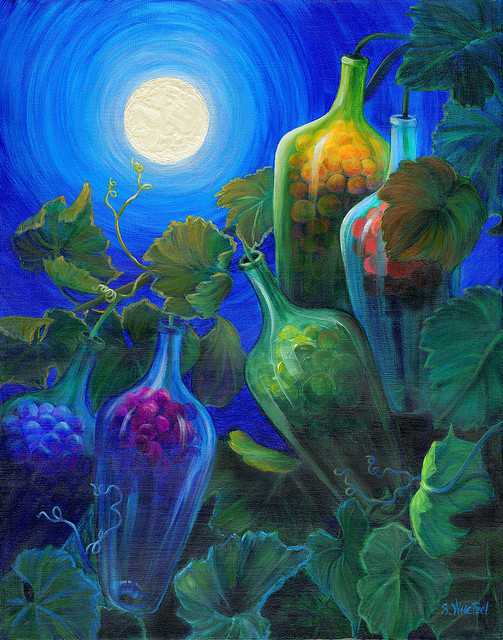FWP:
SETS == EK; IZAFAT
WINE: {49,1}
Josh points out the wordplay between 'wave' and 'storm'. Calling the wave of greenery and the wave of wine 'stormy ones' [:tuufaanii] makes them seem as overwhelming as a typhoon [:tuufaa;N], which is an irresistible rush of air and water that sweeps all before it. After all, isn't the verdant, breeze-filled garden, when combined with the intoxicating rush of the wine, equally potent-- and equally devastating?
This verse not only centers on kaifiyat , 'mood', but actually contains the word kaifiyat itself (here spelled kaifiiyat , with a tashdiid , for metrical reasons). The 'mood' has reached a special, overpowering level that extends over a wide range-- 'from' the wave of greenery 'to' the wave of wine.
But over a wide range of what? If it's space, then the range is from the garden to the convivial gathering where the drinkers and the Cupbearer gather. And if it's time, then the wave of greenery includes the new fresh buds on the grape-vines that are destined eventually to become the wave of wine.
Thanks to the versatility of the i.zaafat , moreover, the relationship between the 'stormy ones' and the 'mood of the season' could go in more than one direction. Are the 'stormy ones' themselves (passively) intoxicated by the mood of the season? Or are they 'stormy' because they (actively) stir up and generate the mood of the season? Since the line features two i.zaafat constructions in a row, there are still other possibilities, but these seem the most provocative; for more on the possibilities of the i.zaafat , see {16,1}.
Moreover, what exactly is the 'season' being referred to? On the question of the 'rainy season' versus 'springtime', see {49,4}.
In our Urdu poetry reading group, we recently (May 14, 2010) came up with 'on a roll' to transcreate ek ((aalam pah . Here's to our very enjoyable group, and to all of you who were there! And especially to Zahra-- may she have a good trip back to Pakistan.

Nazm:
That is, the wave of wine and the wave of greenery have created a storm of the mood of the spring season-- that is, of joy and delight. (46)
== Nazm page 46